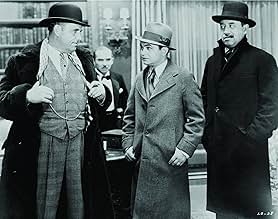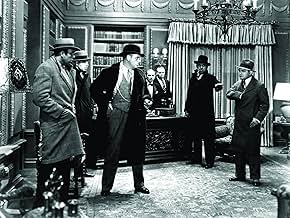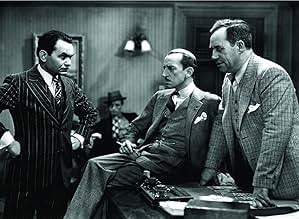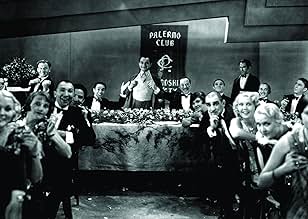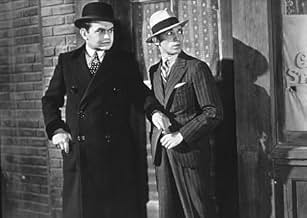AVALIAÇÃO DA IMDb
7,2/10
15 mil
SUA AVALIAÇÃO
Um criminoso de baixo escalão busca ascender no mundo do crime organizado.Um criminoso de baixo escalão busca ascender no mundo do crime organizado.Um criminoso de baixo escalão busca ascender no mundo do crime organizado.
- Direção
- Roteiristas
- Artistas
- Indicado a 1 Oscar
- 2 vitórias e 1 indicação no total
Thomas E. Jackson
- Sgt. Flaherty
- (as Thomas Jackson)
Nicholas Bela
- Ritz Colonna
- (as Nick Bela)
Ernie Adams
- Cashier
- (não creditado)
Elmer Ballard
- Bat Carilla
- (não creditado)
Ferike Boros
- Mrs. Passa
- (não creditado)
Kernan Cripps
- Detective
- (não creditado)
George Daly
- Machine-Gunner
- (não creditado)
Adolph Faylauer
- New Year's Celebrant
- (não creditado)
Avaliações em destaque
There's a villain and he's out to make his name, Caesar Enrico Bandello, just has no shame, with a cannon in his hand, shoot you down just where you stand, there's no way that he'll be stopped, he won't be tamed. He's taken over a small gang, after a heist, where the crime commissioner has paid a price, a rival boss then shoots him down, but it only leaves a frown, then 'Big Boy' gives him Chicago's Northside vice.
Isn't Edward G. Robinson always spellbinding, especially in his more devious roles. The ascent and decent of a larger than life ego, the cost to others and the ultimate price paid in the quest for power.
Isn't Edward G. Robinson always spellbinding, especially in his more devious roles. The ascent and decent of a larger than life ego, the cost to others and the ultimate price paid in the quest for power.
Edward G. Robinson's memorable performance in "Little Caesar" is rightfully one of his best-remembered roles. While he deserves also to be remembered for his versatility in many other performances as well, it's easy to see why this one in particular is still remembered. Along with James Cagney's role in "The Public Enemy", Robinson's portrayal here helped to exemplify the kinds of characters that for some time defined the genre.
The story is not without interest in itself, as it follows the rise and decline of various gangsters and their followers. The fragile nature of their form of 'power' comes across quite clearly, and of course there is plenty of action as well. It's not especially subtle, but it wasn't supposed to be. The supporting cast all give solid performances, but Robinson's character is always the center of attention. Douglas Fairbanks, Jr. has the most interesting character to work with among the supporting roles.
The story moves at a good pace, especially given its release date, and is over almost before you know it. Even aside from Robinson, it's one of the better features of the earliest years of sound movies, handling the dialogue and sound better than most. Like "The Public Enemy", it was set in its own time, but it's a good production overall that still works rather well decades later.
The story is not without interest in itself, as it follows the rise and decline of various gangsters and their followers. The fragile nature of their form of 'power' comes across quite clearly, and of course there is plenty of action as well. It's not especially subtle, but it wasn't supposed to be. The supporting cast all give solid performances, but Robinson's character is always the center of attention. Douglas Fairbanks, Jr. has the most interesting character to work with among the supporting roles.
The story moves at a good pace, especially given its release date, and is over almost before you know it. Even aside from Robinson, it's one of the better features of the earliest years of sound movies, handling the dialogue and sound better than most. Like "The Public Enemy", it was set in its own time, but it's a good production overall that still works rather well decades later.
Seminal gangster film about the rise and fall of Enrico Bandello, a Chicago hoodlum, based on the novel by W.R. Burnett. The prototype for Enrico was, like so many other gangster heroes, mobster Al Capone. If you know a little bit about his life story, you got your basic gangster plot for practically all films that followed, like Tony Camonte in SCARFACE.
This film was the first of "the big three", together with PUBLIC ENEMY (1931) and SCARFACE: SHAME OF THE NATION (1932) and provided the blueprint for the modern gangster crime flic. It was the first gangster film to reach a wide audience and launched Edward G. Robinson to stardom. The story is simple and straightforward and might feel a little overly familiar to modern audiences, but the film lost little of its power and still holds up pretty well. It's a tough movie, but mostly tough talking with not much violence on screen.
But the film would probably be instantly forgettable without Robinson's superb performance. Whenever he's on screen, his presence is incredibly menacing. The rest of the cast is so so, but Thomas Jackson as Flaherty, Rico's nemesis, gives a wonderfully cynical performance, mocking Rico and all the other gangsters. Like most other early gangster films, it lacks the real emotional depth and complexity that came with later films, like the French gangster films of the fifties or THE GODFATHER and was made primarily as popular entertainment. Pleasant entertainment nevertheless with Edward G. Robinson portraying the first classic gangster role in screen history.
Camera Obscura --- 8/10
This film was the first of "the big three", together with PUBLIC ENEMY (1931) and SCARFACE: SHAME OF THE NATION (1932) and provided the blueprint for the modern gangster crime flic. It was the first gangster film to reach a wide audience and launched Edward G. Robinson to stardom. The story is simple and straightforward and might feel a little overly familiar to modern audiences, but the film lost little of its power and still holds up pretty well. It's a tough movie, but mostly tough talking with not much violence on screen.
But the film would probably be instantly forgettable without Robinson's superb performance. Whenever he's on screen, his presence is incredibly menacing. The rest of the cast is so so, but Thomas Jackson as Flaherty, Rico's nemesis, gives a wonderfully cynical performance, mocking Rico and all the other gangsters. Like most other early gangster films, it lacks the real emotional depth and complexity that came with later films, like the French gangster films of the fifties or THE GODFATHER and was made primarily as popular entertainment. Pleasant entertainment nevertheless with Edward G. Robinson portraying the first classic gangster role in screen history.
Camera Obscura --- 8/10
Rico Bandello, a petty crook nicknamed LITTLE CAESAR, plots his rise to become crime boss of the Big City.
Edward G. Robinson made a tremendous impact in this star-making saga of a thoroughly detestable little man who bandies his way through society's underbelly for a short time until fate brings him his just reward. The evil spawn of a deplorable age, Rico cares for neither booze nor dames, only pure raw power. Even loyalty & friendship are weaknesses to be deplored since no one can be ultimately trusted. Robinson, with his frightening eyes and large ugly mouth, makes this human scum fascinating to watch - a cheap little monster in expensive suits, a moral nonentity with a big gun.
Douglas Fairbanks Jr does a fine job with what little the script gives him as Rico's longtime buddy; the bland nature of his performance contrasts nicely to Robinson's florid acting style. Even more compelling is Glenda Farrell in an important early role as Fairbanks' girlfriend - this talented actress would soon become one of Hollywood's premiere tough talking brassy blondes.
Stanley Fields, Sidney Blackmer & George E. Stone all deliver vivid portraits of crooks & criminals that Rico must intimidate or use. Special mention should be made of William Collier Jr who gives a touching portrayal as the mob's getaway driver who loses his nerve and attempts to go straight.
Movie mavens will recognize an unbilled Lucille La Verne as the old crone who intimidates Rico near the end of the picture.
With LITTLE CAESAR and PUBLIC ENEMY (1931) Warner Brothers established themselves as the Studio that could produce topnotch, gritty crime dramas. The reputation was well deserved and the films were appreciated by movie viewers already enthralled by the headline exploits of real life Depression desperadoes.
Edward G. Robinson made a tremendous impact in this star-making saga of a thoroughly detestable little man who bandies his way through society's underbelly for a short time until fate brings him his just reward. The evil spawn of a deplorable age, Rico cares for neither booze nor dames, only pure raw power. Even loyalty & friendship are weaknesses to be deplored since no one can be ultimately trusted. Robinson, with his frightening eyes and large ugly mouth, makes this human scum fascinating to watch - a cheap little monster in expensive suits, a moral nonentity with a big gun.
Douglas Fairbanks Jr does a fine job with what little the script gives him as Rico's longtime buddy; the bland nature of his performance contrasts nicely to Robinson's florid acting style. Even more compelling is Glenda Farrell in an important early role as Fairbanks' girlfriend - this talented actress would soon become one of Hollywood's premiere tough talking brassy blondes.
Stanley Fields, Sidney Blackmer & George E. Stone all deliver vivid portraits of crooks & criminals that Rico must intimidate or use. Special mention should be made of William Collier Jr who gives a touching portrayal as the mob's getaway driver who loses his nerve and attempts to go straight.
Movie mavens will recognize an unbilled Lucille La Verne as the old crone who intimidates Rico near the end of the picture.
With LITTLE CAESAR and PUBLIC ENEMY (1931) Warner Brothers established themselves as the Studio that could produce topnotch, gritty crime dramas. The reputation was well deserved and the films were appreciated by movie viewers already enthralled by the headline exploits of real life Depression desperadoes.
Boy, is this gangster movie dated but Edward G. Robinson makes it so entertaining! Robinson, like James Cagney, can dominate a film. He certainly does that in this movie, and is sure fun to watch as "Enrico Bandello."
Everything about the movie, including the DVD transfer (although a lot better than the VHS) is dated-looking and sounding, but that helps make it interesting. The dialog is so passe that it's almost weird. I put on the English subtitles so I could understand everything because the slang of those days is something foreign to us nowadays. The different expressions of the day are fun to hear (and read).
The acting by the man (Thomas Jackson?) who plays the main cop is also strange, very wooden-like. He just didn't sound natural. Some of the other actors were likewise, others were fine. It was one of the early "talkies" so maybe things were still needed to be smoothed out, film-wise and acting-wise. In other words, some of the actors sounded professional and others amateurish.
The following year, James Cagney's "Public Enemy" came out and was much better, production-wise. What a big difference in the camera-work, for one. This film may not be the caliber of "Public Enemy" but it's still good and one to have in your collection.
Everything about the movie, including the DVD transfer (although a lot better than the VHS) is dated-looking and sounding, but that helps make it interesting. The dialog is so passe that it's almost weird. I put on the English subtitles so I could understand everything because the slang of those days is something foreign to us nowadays. The different expressions of the day are fun to hear (and read).
The acting by the man (Thomas Jackson?) who plays the main cop is also strange, very wooden-like. He just didn't sound natural. Some of the other actors were likewise, others were fine. It was one of the early "talkies" so maybe things were still needed to be smoothed out, film-wise and acting-wise. In other words, some of the actors sounded professional and others amateurish.
The following year, James Cagney's "Public Enemy" came out and was much better, production-wise. What a big difference in the camera-work, for one. This film may not be the caliber of "Public Enemy" but it's still good and one to have in your collection.
Você sabia?
- CuriosidadesThe character of Cesare Enrico Bandello is not, as widely believed, based on Al Capone. Instead, he is based on Salvatore "Sam" Cardinella, a violent Chicago gangster who operated in the early years of Prohibition.
- Erros de gravaçãoRico is hit by the bullet sufficiently to require bandaging by Scabby, but the overcoat he was wearing has no bullet hole in it, nor is there any trace of blood in the subsequent scene in Little Arnie's office.
- Citações
[last lines]
Caesar Enrico Bandello: Mother of Mercy! Is this the end of Rico?
- Versões alternativasIn the 1954 re-release, a foreword crawl was added, warning that the "heroes" of Little Caesar and Inimigo Público (1931) represent "a problem that sooner or later we, the public, must solve." This version is often shown on cable channels.
- ConexõesFeatured in Hollywood: The Fabulous Era (1962)
Principais escolhas
Faça login para avaliar e ver a lista de recomendações personalizadas
- How long is Little Caesar?Fornecido pela Alexa
Detalhes
- Data de lançamento
- País de origem
- Idioma
- Também conhecido como
- Little Caesar
- Locações de filme
- Empresa de produção
- Consulte mais créditos da empresa na IMDbPro
- Tempo de duração
- 1 h 19 min(79 min)
- Cor
Contribua para esta página
Sugerir uma alteração ou adicionar conteúdo ausente



